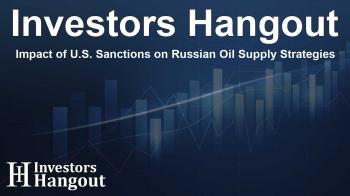Impact of U.S. Sanctions on Russian Oil Supply Strategies

The Shift in Oil Sourcing for China and India
The recent U.S. sanctions aimed at Russian oil producers have begun to significantly reshape the global oil landscape, particularly for key consumers such as China and India. Amid stricter regulations, refiners in these countries are now looking to the Middle East, Africa, and the Americas for their oil supplies, consequently affecting prices and shipping costs.
Understanding the New Sanctions
U.S. financial authorities have imposed sanctions on various Russian oil producers, as well as numerous vessels implicated in the transportation of Russian oil. The goal of these sanctions is to undermine revenue streams that support ongoing military actions. These measures are a response to growing concerns about energy supply chains and international security.
Pivotal Changes in the Oil Trade
Before these sanctions, a substantial volume of Russian crude made its way to China and India, largely with the assistance of a fleet of tankers that are now sanctioned. According to industry analysts, around 530 million barrels of Russian crude were transported by these ships last year. A significant portion ended up in China, with others servicing India's substantial oil needs.
How Supply Chains Are Adapting
As the sanctions take root, traders expect a notable decline in the quantity of Russian oil available for purchase. This scarcity is projected to result in heightened operational costs for independent refiners in China, who may find it necessary to adjust their refining outputs to meet the new market realities. The adjustments in supply chains will also mean increased shipping rates, which will likely further complicate procurement strategies.
Market Reactions and Economic Implications
The immediate aftermath of the sanctions has seen spot prices for Middle Eastern and African oil surge, as demand remains robust from nations striving to fill the gap left by Russian crude. Some analysts note that prices for oil from Brazil are also on the rise, reflecting the urgent need for Asian countries to secure alternative supplies. This shift indicates a broader realignment of trade relationships in the oil market, driven by necessity.
Exploring Alternative Sources
In response to the upheaval in the Russian oil market, countries like China and India must explore alternatives for their energy demands. There is an increasing consensus that Middle Eastern oil provides a viable option. Additionally, Indian refiners may consider tapping into U.S. oil if the pricing aligns with their operational budgets. The realignment in supply chains signals an evolving oil market landscape.
Market Forecast and Future Trends
Market experts predict that the sanctions on Russian oil will lead to unintended consequences, including price fluctuations that may impact global strain. Analysts warn that Russian crude may be sold at discounted rates, potentially drawing refiners back to the market if they can find ways to mitigate the sanctions. The competition for Middle Eastern oil is likely to increase aggressively as buyers scavenge for available volumes.
The Impact on Local Refineries
As the situation unfolds, local refineries must adapt quickly to avoid disruptions. Indian and Chinese importers might have to pivot towards sourcing Middle Eastern oil more frequently, which could usher additional volatility in oil pricing. The expected competition for oil cargoes leads to concerns about maintaining consistent supply while managing operational costs.
Conclusion: Navigating a Changing Landscape
In conclusion, U.S. sanctions are significantly influencing the direction of oil sourcing for major consumers like China and India. As these nations confront new challenges, the push for alternative oil supplies will reshape their procurement strategies, potentially affecting global oil prices and market dynamics for the foreseeable future.
Frequently Asked Questions
What are the new sanctions targeting?
The new U.S. sanctions are aimed at Russian oil producers and vessels, seeking to disrupt supply chains that fund military operations.
How will these sanctions affect oil prices?
Experts anticipate rising oil prices as supply from Russia decreases and demand shifts towards other regions such as the Middle East.
What alternatives will China and India consider?
Both countries are likely to seek more oil sourcing from the Middle East, Africa, and potentially North America to meet their energy needs.
How does this impact the global market?
The sanctions and shift in sourcing strategies can lead to increased competition for oil and potential fluctuations in global oil prices.
Will Russian oil still be available?
While sanctions will restrict access, Russian oil may still be available at discounted prices, although trade complexities will increase.
About The Author
Contact Lucas Young privately here. Or send an email with ATTN: Lucas Young as the subject to contact@investorshangout.com.
About Investors Hangout
Investors Hangout is a leading online stock forum for financial discussion and learning, offering a wide range of free tools and resources. It draws in traders of all levels, who exchange market knowledge, investigate trading tactics, and keep an eye on industry developments in real time. Featuring financial articles, stock message boards, quotes, charts, company profiles, and live news updates. Through cooperative learning and a wealth of informational resources, it helps users from novices creating their first portfolios to experts honing their techniques. Join Investors Hangout today: https://investorshangout.com/
The content of this article is based on factual, publicly available information and does not represent legal, financial, or investment advice. Investors Hangout does not offer financial advice, and the author is not a licensed financial advisor. Consult a qualified advisor before making any financial or investment decisions based on this article. This article should not be considered advice to purchase, sell, or hold any securities or other investments. If any of the material provided here is inaccurate, please contact us for corrections.

